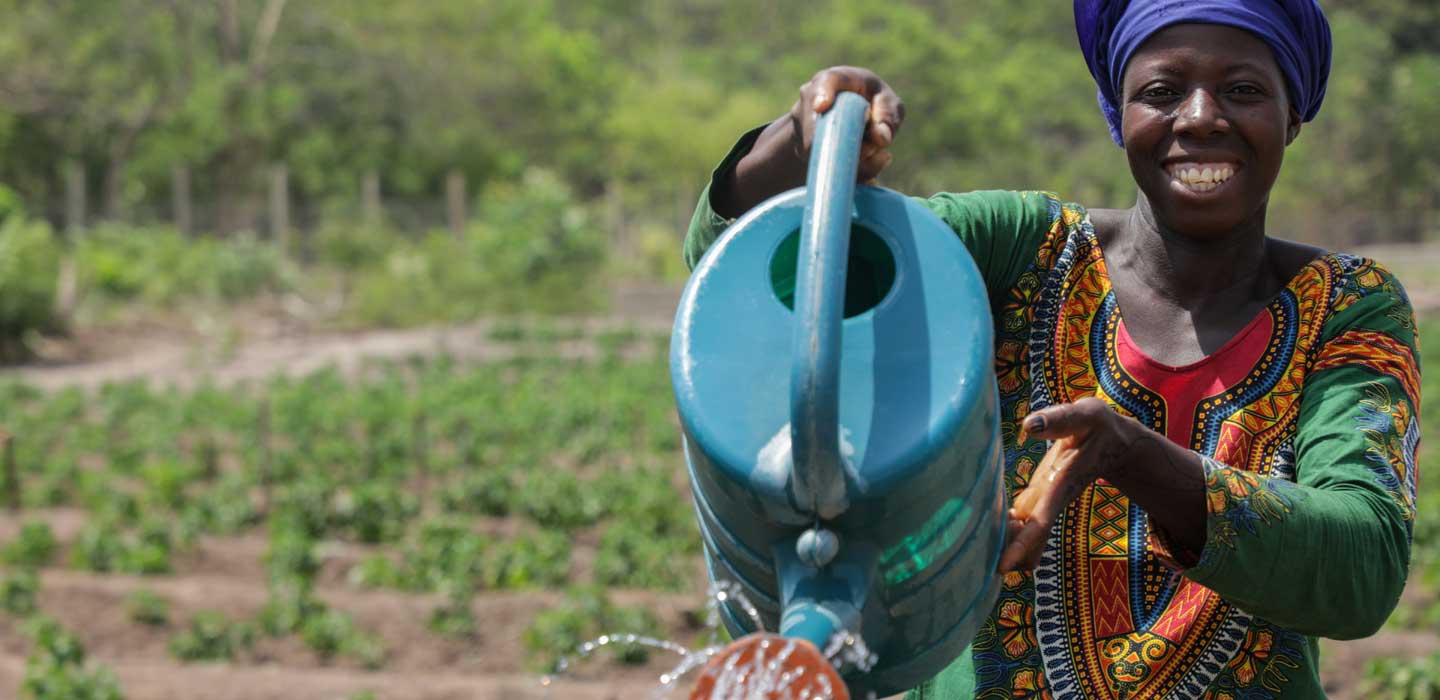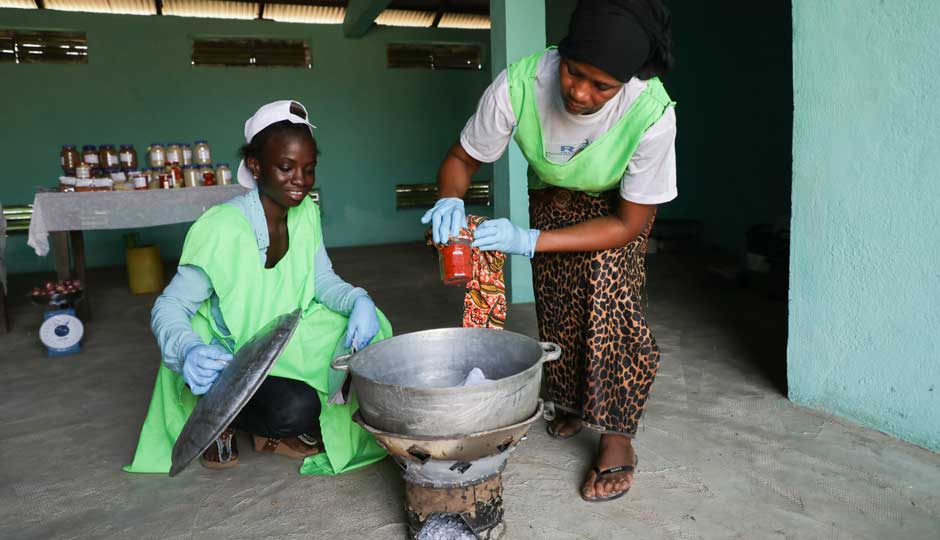من المزرعة إلى السوق: تحسين سلسلة القيمة الغذائية من خلال تمكين المرأة في غينيا
IFAD Asset Request Portlet
ناشر الأصول
From farm to market: improving the food value chain through women empowerment in Guinea
المقدر للقراءة دقيقة 7
©IFAD/Barbara Gravelli
Saran Condé is a 30-year-old smallholder farmer in Guinea's Faranah region. She has improved her farming skills and increased her productivity since joining, early this year, an IFAD supported community garden in Salya village, where she found much better conditions to grow crops and the opportunity to learn from agricultural experts.
Thanks to IFAD's support, Saran now counts on adequate fertilization, organized row planting, stronger fences to divert animal intrusions and increased access to water provided by a solar-powered system. She grows peppers, aubergines and lettuces, making higher incomes to improve her family's livelihoods. There is also a very good work-life balance in her new routine. While her three older children attend school, the two-year-old spends the day in the garden with other farmers’ children where they can play freely.
Working in Salya has been a great source of motivation for Saran, who became widow five months ago. She has received support from her colleagues from producers' association, Kankelen. It has 450 members, of which 350 are women, who work in three gardens. "There is a lot of solidarity here," she says, acknowledging how much women farmers have in common and help each other.
Established in 2018, the Salya garden is among 20 gardens benefitting from the IFAD-supported PNAAFA-LGF programme. Provision of equipment, technologies and training are helping to transform the lives of smallholder farmers with impact on the food value chain across Guinea. Farmers enjoy the opportunity to work, learn, share and socialize together. The gardens count on farmer field schools (FFS) through which technical counselors give regular training sessions on agricultural techniques, business skills and group association.
Transformation towards zero waste
Nobody likes food losses and waste, especially farmers when vegetables go rotten and they lose revenue. To avoid that and make crops more profitable for smallholders, PNAAFA-LGF has engaged beneficiaries in food transformation activities, delivering training sessions on canning to 204 farmers – of which 173 are women – contributing to preserve vegetables for longer.
Mamah Samoura is among 45 farmers of the Kankelen association who have attended such training in Faranah. Thanks to the sessions, she has developed new skills and now she not only grows vegetables, but also processes 25 types of crops produced by herself and her partners, such as tomatoes, peppers, onions and eggplants. "Vegetables that before were rotten in few days or weeks can now last for even six months inside glass jars like this", says Mamah while pointing to a tomato sauce jar.
Food transformation can drastically reduce the waste of fresh ingredients as well as diversifies food use and consumption over year-round instead of just seasonally. It likewise strengthens smallholders' finances given the added value and time-efficiency of the process. For instance, roughly two kilos of tomatoes, that would otherwise be wasted, can be preserved as tomato sauce and sold for three times the price.
 |
|
©IFAD/Barbara Gravelli |
Now they have the capacity for canning, beneficiaries in Faranah are sharing this knowledge with others. University students of agriculture are undergoing internships to observe and practice food transformation techniques with Mamah and her colleagues.
"Here I am having the opportunity to acquire valuable skills for my future", says Françoise Toffa Mansaré, 22 year-old who is among ten interns working with the Kankelen association. A fast-learner, she sees this internship as a constructive way to complement her undergraduate studies at the Higher Institute of Agronomy and Veterinary of Faranah. While combining classroom education with practical field exercises, Françoise looks forward to new experiences "anywhere in the world" after graduating next year.
Training for trading
One can be very good in farming or canning but unskilled to market products, and this barrier can make a considerable difference for a household income as well as for consumers who might not be aware of what goods are available to buy. To fill this gap IFAD has provided marketing guidance to farmer associations across Guinea, fostering sustainable fair trade of agricultural products.
In Faranah, food processors of the Kankelen association have scaled up their sales and are being recognized by the local community, who regularly visits the storehouse where vegetables are canned. Consumers can just go in and purchase what they want, dealing directly with the artisans at the atelier.
As the word of mouth spreads fast, the business has expanded, and their cans and jars are also available in local fairs in the region. "We are proud to see our products out in the market", says Umu Camara, president of the Kankelen association, herself an avid producer and merchandiser.
IFAD's investments in Guinea also benefit the retailing sector, for which young rural entrepreneurs have received financial support to establish their own businesses. Aissatou Lamarana Bah is a 25 year-old undergraduate student who opened a small shop in Faranah that sells seeds and fertilizers thanks to an IFAD loan. She regularly pays it back and within seven months will have paid it off.
As well as studying, Aissatou has received training on trade and merchandising. Her business is doing quite well and she started to make a profit in the first three months, becoming known for pioneering the only shop of its kind in Upper Guinea. "I have customers coming from many places in Faranah and elsewhere, even from Sierra Leone", says this visionary female entrepreneur, who plans to expand her activities and diversify the products available in the shelves.
تاريخ النشر: 27 يونيو 2019